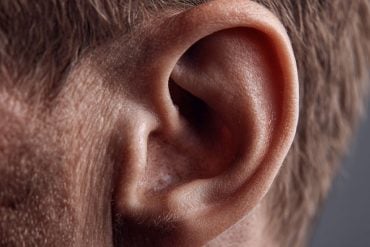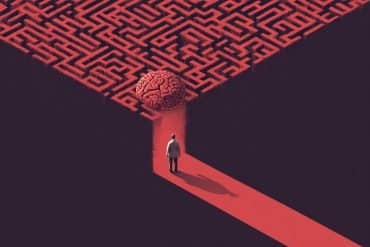Summary: Three factors have been identified that help keep your brain at its best.
Source: NTNU
Your brain is pretty fabulous. Around 100 billion nerve cells work together to keep you nimble and quick in your thinking.
But just like the rest of the body, your brain may not be quite as vigorous when you get a little older. Maybe you find yourself having to write things down, or you forget appointments, or can’t quite follow the conversation or action on TV without straining.
Luckily, it’s possible to exercise your brain too.
“The keys to our nervous system are the gray and white matter,” says Hermundur Sigmundsson, a professor at NTNU’s Department of Psychology.
Roughly speaking, the gray matter consists of the nerve cells—or neurons—and dendrites, while the white matter provides the contacts between the cells (myelinated axons) and contributes to the transmission speed and distribution of the signals.
Three factors contribute to good brain health
A recent article in the journal Brain Sciences brings together a lot of what we know from previous research in the field of brain health. The researchers went to great lengths to be thorough in their theoretical perspective paper and offer 101 references to articles on how to keep our gray and white matter in shape.
“Three factors stand out if you want to keep your brain at its best,” says Sigmundsson.
These factors are:
- Physical exercise.
- Being social.
- Having strong interests. Learn new things and don’t hold back from new challenges.
1. Motion
This is probably the biggest challenge for many of us. Your body gets lazy if you sit on your bum too much. Unfortunately, the same is true for the brain too.
“An active lifestyle helps to develop the central nervous system and to counteract the aging of the brain,” according to Sigmundsson and his colleagues.
So it’s important not to get stuck in your chair. This requires effort, and there’s no way around it. If you have a sedentary job, go to school or when you’re done work, you need to activate yourself, including physically.
2. Relations
Some of us are happiest alone or with just a few people, and we know that “hell is other people”—if we transcribe writer-philosopher Jean Paul Sartre’s phrase a little loosely. (Although his version was admittedly somewhat more involved.) But in this regard, you have to steel yourself.

“Relations with other people, and interacting with them, contribute to a number of complex biological factors that can prevent the brain from slowing down,” says Sigmundsson.
Being with other people, such as through conversation or physical contact, supports good brain function.
3. Passion
This last point may have something to do with your personality, but if you’ve read this far, chances are good that you already have the necessary foundation and are probably willing to learn.
“Passion, or having a strong interest in something, can be the decisive, driving factor that leads us to learn new things. Over time, this impacts the development and maintenance of our neural networks,” Sigmundsson says.
Stay curious. Don’t give up and just let everything run its course the same way all the time. You’re never too old to do something you’ve never done before. Maybe now is the time to learn to play a new musical instrument.
Use it or lose it
Sigmundsson collaborated with master’s student Benjamin H. Dybendal and associate professor Simone Grassini at the University of Stavanger on the comprehensive paper.
Their research thus presents a similar picture for the brain as for the body. You have to exercise your brain so that it doesn’t decay. “Use it or lose it,” as the saying goes.
“Brain development is closely linked to lifestyle. Physical exercise, relationships and passion help to develop and maintain the basic structures of our brain as we get older,” says Sigmundsson.
These three factors thus offer some of the keys to maintaining a good quality of life—and hopefully—aging well.
About this brain health research news
Author: Steinar Brandslet
Source: NTNU
Contact: Steinar Brandslet – NTNU
Image: The image is in the public domain
Original Research: Open access.
“Motion, Relation, and Passion in Brain Physiological and Cognitive Aging” by Hermundur Sigmundsson et al. Brain Sciences
Abstract
Motion, Relation, and Passion in Brain Physiological and Cognitive Aging
The aim of the current paper was to present important factors for keeping the basic structures of a person’s brain function, i.e., the grey and white matter, intact.
Several lines of evidence have shown that motion, relation, and passion are central factors for preserving the neural system in the grey and white matter during ageing.
An active lifestyle has shown to contribute to the development of the central nervous system and to contrast brain ageing.
Interpersonal relationships, and interactions, have shown to contribute to complex biological factors that benefit the cognitive resilience to decline.
Furthermore, the current scientific literature suggests that passion, strong interest, could be the driving factor motivating individuals to learn new things, thus influencing the development and maintenance of the neural functional network over time.
The present theoretical perspective paper aims to convey several key messages: (1) brain development is critically affected by lifestyle; (2) physical training allows one to develop and maintain brain structures during ageing, and may be one of the keys for good quality of life as an older person; (3) diverse stimuli are a key factor in maintaining brain structures; (4) motion, relation, and passion are key elements for contrasting the loss of the grey and white matter of the brain.







